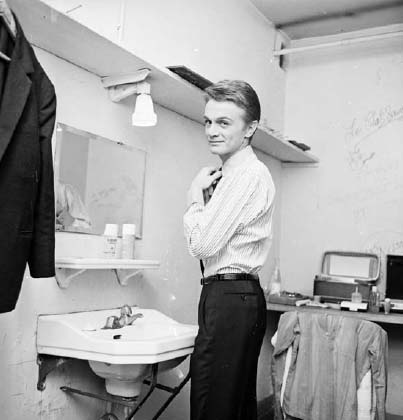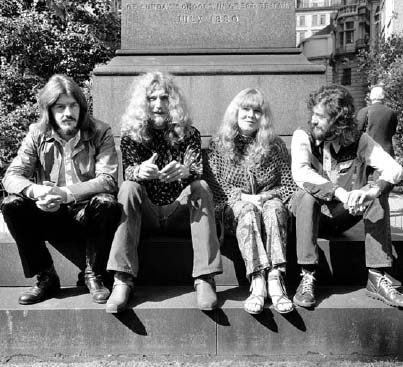The Encyclopedia of Dead Rock Stars (54 page)
Read The Encyclopedia of Dead Rock Stars Online
Authors: Jeremy Simmonds

In 1956, the growing Suez Canal crisis caused the young singer, his French father and Italian mother to up sticks from their base in Egypt and move to Monte Carlo, Claude François getting an early taste of the revue bars that were soon to become his world. With his father sick and unable to work, the family found it hard to make ends meet in Monaco, so the young François took a job as drummer in a nightclub band: using the opportunity to test his singing voice, the good-looking blond crooner quickly became very popular. By 1960 ‘Clo-Clo’ (as he was dubbed) was married but nonetheless wowing a generation of young women with his thinly disguised impersonations of American rock ‘n’ roll stars at venues in Paris and along the Côte d’Azur. Soon, his covers of Everly Brothers, Trini Lopez and even Beatles hits would take François to the upper reaches of the French hit parade, while his own
‘Belles, Belles, Belles’
reportedly sold over 1.5 million copies in 1962. Francois’s composition
‘Comme d’habitude’
then became one of the most recognized tunes in the world: with lyrics reworked by Paul Anka, it morphed into the much-covered and muchloved ‘My Way’.
Claude François found the British and American markets harder to crack in the early seventies, his showmanlike performances considered a touch dated by the two musical epicentres (his one British hit, 1976’s truly ghastly ‘Tears on the Telephone’, barely scraped into the Top Forty). Nevertheless, François was a massive draw live, playing a series of sellout dates in the UK in 1975. At this period in his career, he narrowly escaped death on three separate occasions: first, collapsing from exhaustion, second, avoiding a London IRA bombing by just seconds – and finally escaping a deranged fan with a shotgun (a windmill at his home also burned down during this time). In 1978, however, Claude Francois braved a return to London for further shows and a TV special. Within days, his luck ran out and he became the latest in 1978’s growing list of accidental pop fatalities. Having returned with his girlfriend to their Paris apartment, he prepared for another television appearance on TF1’s
Rendezvous de Dimanche
the following day. After showering, Francois noticed that a bulb needed changing. So, standing with his feet in the water, the singer attempted to replace it – and was instantly electrocuted; all efforts to revive him failed and Francois was declared deceased at 3.30 pm. Nearly 400 attended his funeral at a church in Auteuil, and many inconsolable fans mourned outside (reports suggest that at least two fans committed suicide in the aftermath). On the twenty-second anniversary of his death, Place Claude Francois in Paris was unveiled in the singer’s memory.

Claude François: A song, a shower and a short circuit
APRIL
Friday 14
Hanus Berka
(Prague, Czechoslovakia, 15 December 1940)
Emergency

Hanus Berka never reached celebrity status as such, but he was nonetheless an influential figure in European orchestral rock in the early seventies. Classically trained and keen on electronica, Berka was a founder of Emergency, a unit originally put together as a house band for the Czech version of the popular (if controversial) stage musical
Hair.
A multi-instrumentalist who had a gift for arranging and organization, Berka rightly saw more potential in this group of musicians, keeping the majority of them together to record a trio of albums of jazz-flavoured rock. (One member of this line-up was singer Peter Bischof, who later earned the dubious distinction of writing hits for Milli Vanilli.)
The bad year for jazz-rock musicians continued. A sufferer of the sleeping disorder narcolepsy, Hanus Berka was killed at the wheel of his car, just yards from the front door of his house. Losing control of the vehicle, he unwittingly veered into a tree, and died in the collision.
Friday 21
Sandy Denny
(Alexandra Elene MacLean Lucas - Wimbledon, London, 6 January 1947)
Fairport Convention
Fotheringay
(The Strawbs)

Almost thirty years after her death, Sandy Denny’s remains the first name on most lips when talk turns to folk divas. She was a cut above most of her contemporaries, both as a solo vocalist and as a key member of that most celebrated British group Fairport Convention. In 1968, having abandoned her studies at Kingston College of Art (where her contemporaries included guitarist Jimmy Page), Denny took her subtle soprano to the 2-year-old group – which comprised a remarkable collection of folk luminaries, Ashley Hutchings, Richard Thompson and Ian Matthews – via a couple of short stints recording with The Strawbs. Denny’s vast knowledge of traditional British folk made her the group’s most significant member during her admittedly brief time in the ranks, influencing a change of direction for Fairport with the album
What We Did on Our Holidays
(1969), one of three recordings in her eighteen months with the group. This honeymoon period ended tragically, however, with the death of drummer Martin Lamble as they toured
IJnhalfbricking ( May 1969).
May 1969).
Another album,
Liege and Lief
(1969), then upset Fairport diehards because the band dared to follow American counterparts by going electric. The move also caused unrest within the ranks of Fairport Convention, Ian Matthews leaving to form Matthews Southern Comfort.

Sandy Denny with heavy friends - in this case, three-quarters of Led Zeppelin
This unsettling period unsurprisingly led to Denny’s departure from the group. She formed Fotheringay (named after one of her popular Fairport compositions), but again this was not to last. Denny’s best work hereafter was her live, solo outings – her fragile voice generally worked better without backing. On other occasions she sang ‘Battle of Evermore’ on Led Zeppelin’s fourth album (teaming up once again with Page) and there was even a brief reconciliation with Fairport during 1975, before her last solo set
Rendezvous
was finally issued in 1977. Sandy Denny’s last years were both tragic and unflattering. Troubled by alcohol abuse, Denny was desperate to become a mother, believing that this would complete a world she was finding it harder and harder to deal with. The birth of her daughter, Georgia, however, only compounded a life fast unravelling. Known to have used cocaine (and possibly heroin) during gestation, Denny caused her many friends concern with her behaviour as a new mother. She frequently drove her orange VW Beetle while drunk – often with the baby aboard – and the otherwise photogenic singer had begun to look haggard in live performance.
DEAD INTERESTING!
MAIS JE NE DOIS PAS PARTIR!
You couldn’t make it up - though clearly somebody did. Former Fairport Convention violinist Dave Swarbrick was amazed when the
Daily Telegraph
published his obituary on 20 April 1999. True, he’d been unwell (he underwent a double lung transplant five years later) - but
dead?
Although they offered a written apology, the newspaper failed to present any kind of explanation for the error, prompting Swarbrick to offload signed photocopies of the piece at a gig in Coventry. For which the
Telegraph
then threatened legal action for breach of copyright.

Sandy Denny with heavy friends – in this case, three-quarters of Led Zeppelin
